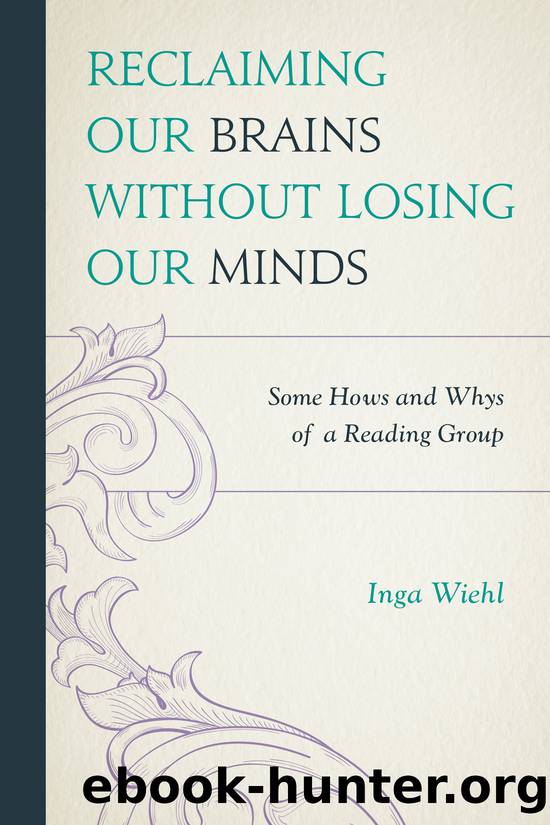Reclaiming Our Brains Without Losing Our Minds by Wiehl Inga;

Author:Wiehl, Inga;
Language: eng
Format: epub
ISBN: 9780761862383
Publisher: Hamilton Books
Published: 2013-10-30T00:00:00+00:00
13
Pasternakâs Dr. Zhivago and the Horsemen of the Apocalypse
In the winter of 2006, following our third and last meeting on Boris Pasternakâs Dr. Zhivago (published in English in 1958), I received four e-mails expressing the sendersâ delight in the novel, the âspiritedâ discussion it had engendered, and their regrets at its having come to the end. âI hate to see it end,â wrote one Reader, and another admitted that her brain âwould be processing for quite some time the many and varied ideas presented.â
Pasternak considers Dr. Zhivago his âchief and most importantâ work. To allow publication in England and Italy, he risked the wrath of Soviet officialdom and even exile. We read his touching letter of October 31, 1958, to Mr. Khrushchev pleading to be allowed to stay in Russia and assuring him that he would and could reject the Nobel Prize offered him for the novel. âFor me to leave my country would be to die. I, therefore, ask you not to take this extreme measure against me. I can say with my hand on my heart that I have contributed to Soviet literature, and that I can still be of use to it.â
It is unclear whether this appeal or pressure from the West on the Soviets, or perhaps a combination of the two, effected his permission to stay. But remain in Russia he did although his parents and two sisters had departed for Europe.
Soviet critics objected to the spirit of religion pervading the book, the openly critical stance towards Marxism as a science, and the scorn for the empty rhetoric of leaders and politicians. In short, they criticized all that, in Pasternakâs view, constitutes being human rather than animals in a circus, snapped into obedience by the whip of a tamer.
Like John Donne, who insisted that âno man is an island,â Pasternak believed that there is no action not tied to other actions; no life is independent. Keeping that in mind, Readers made a careful study of the intricate interweaving of action and characters in Part I of the novel: Yuri and his uncle, Nikolai, his friend Pasha, and Nika, who hides to avoid the younger Yuri who wants to engage him in play. We got caught up in the lives of Tonia Gromeko, who becomes Yuriâs wife, in Lara most especially, his future lover, and her demon, the lawyer Komarovsky. Their encounters and separations, planned or accidental, prepare us for the many coincidental meetings occurring through the rest of the novel and invite us to look beyond the surface realism of the work. Facts are transcended. A horse or a train takes on meanings beyond its function as transportation.
For example, we discussed Laraâs experience looking at the hobbled horse in the yard, the thief who comes and goes, her sense of colors in the world around her, and we learned from her reactions about a world beyond the obvious, as enigmatic to her as it may be to us. Horses occur again and again in a world that is being destroyed as in an apocalyptic vision.
Download
This site does not store any files on its server. We only index and link to content provided by other sites. Please contact the content providers to delete copyright contents if any and email us, we'll remove relevant links or contents immediately.
4 3 2 1: A Novel by Paul Auster(11788)
The handmaid's tale by Margaret Atwood(7447)
Giovanni's Room by James Baldwin(6808)
Asking the Right Questions: A Guide to Critical Thinking by M. Neil Browne & Stuart M. Keeley(5355)
Big Magic: Creative Living Beyond Fear by Elizabeth Gilbert(5351)
Ego Is the Enemy by Ryan Holiday(4956)
On Writing A Memoir of the Craft by Stephen King(4662)
The Body: A Guide for Occupants by Bill Bryson(4582)
Ken Follett - World without end by Ken Follett(4443)
Bluets by Maggie Nelson(4261)
Adulting by Kelly Williams Brown(4232)
Eat That Frog! by Brian Tracy(4149)
Guilty Pleasures by Laurell K Hamilton(4116)
White Noise - A Novel by Don DeLillo(3829)
The Poetry of Pablo Neruda by Pablo Neruda(3814)
Fingerprints of the Gods by Graham Hancock(3738)
Alive: The Story of the Andes Survivors by Piers Paul Read(3730)
The Book of Joy by Dalai Lama(3697)
The Bookshop by Penelope Fitzgerald(3619)
